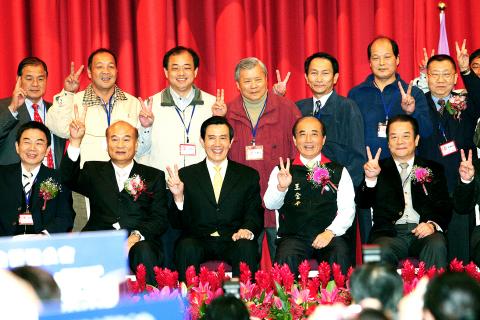|
2012 ELECTIONS:
Waiver shows US support for Ma: KMT
INTERFERENCE? The American Institute in Taiwan
dismissed concerns that Taiwan’s nomination was meant to influence the election,
but analysts said it had ‘connotations’
By Shih Hsiu-chuan / Staff Reporter

President Ma Ying-jeou, front,
third left, makes a “V” sign in Taipei yesterday after Taiwan was listed as a
candidate for the US Visa Waiver Program.
Photo: CNA
The nomination of Taiwan as a candidate
for the US’ Visa Waiver Program (VWP) showed the US government has a high degree
of confidence in President Ma Ying-jeou’s (馬英九) administration, Deputy Minister
of Foreign Affairs Tung Kuo-yu (董國猶) said yesterday.
While the nomination came about mainly because Taiwan has met all the
eligibility requirements for visa-free travel to the US, he added that “it was
also undeniable that the progress was attributed to a high level of mutual trust
between both governments.”
“No matter how much you have done, the result would not have happened without
the existence of mutual trust,” Tung said at a press conference hosted by the
Chinese Nationalist Party (KMT) caucus at the legislature.
The announcement that Taiwan has been nominated by the US Department of State as
a VWP candidate, made three weeks ahead of the presidential election on Jan. 14,
has sparked concerns that it could influence the KMT’s electoral outlook.
American Institute in Taiwan (AIT) Acting Director Eric Madison on Thursday
dismissed those concerns, saying the US judged visa waivers purely on the merits
of statutory requirements rather than any other factors and that the
announcement was made because Taiwan had recently fulfilled the requirements.
However, several KMT lawmakers yesterday touted the Ma administration’s
achievements in winning the visa-free privilege that the US is considering and
124 countries and regions have extended to Taiwanese.
KMT Legislator Pan Wei-kang (潘維剛) said the number of countries and regions to
which Taiwanese can travel without a visa remained at 54 under the Democratic
Progressive Party (DPP) during former president Chen Shui-bian’s (陳水扁)
eight-year tenure, while the number has increased to 124 under Ma.
“After the Sept. 11, 2001, terror attacks, the US has been especially cautious
about entry into the country. That it would like to include Taiwan in its VWP
suggests that Taiwan is a trustworthy country,” she said.
“The achievement has made our passports even more valuable and made Taiwanese
more respected,” she said.
KMT Legislator Lin Yu-fang (林郁方) said the nomination was like a “cardiac
stimulant needle the US injected Ma with” that gave Ma an advantage against DPP
presidential candidate Tsai Ing-wen (蔡英文) in the election.
“The death of Kim Jong-il has brought about an unclear situation for North
Korea. Under that situation, the US wished to see stability in Taiwan’s politics
and in cross-strait relations,” Lin said.
The nomination showed that the US considers Ma to be more capable of maintaining
cross-strait stability, Lin said.
Commenting on that interpretation of the VWP nomination, Edward Chen (陳一新), a
professor at the Graduate Institute of the Americas at Tamkang University, said
that the timing of the announcement “carried political connotations.”
“Although the US has said repeatedly that it has no preference among the two
candidates, its policies have suggested otherwise. The US is still suspicious of
Tsai, mainly because of her cross-strait policies,” Chen said.
The spate of visits by US high-level officials in the past three months,
including US Assistant Secretary of Commerce Suresh Kumar, US Agency for
International Development administrator Rajiv Shah and US Deputy Secretary of
Energy Daniel Poneman, the recent statement made by US Secretary of State
Hillary Rodham Clinton at the APEC summit and the VWP progress dispelled rumors
that the US distrusted Ma owing to his conciliatory cross-strait policies, Chen
said.
Joseph Wu (吳釗燮), a research fellow at the Institute of International Relations
at National Chengchi University and the country’s former representative to the
US in 2007 and 2008, disagreed, saying the US did not act inconsistently with
its promise to maintain neutrality on Taiwan’s election.
“The AIT has said that the nomination has nothing to do with the election,” he
said.
The efforts to push for the inclusion of Taiwan in the VWP stretch back to the
end of 2007, with various rounds of talks held between high-ranking Taiwanese
officials and their counterparts at the US Department of State, the US National
Security Council and the US Department of Homeland Security before the DPP left
office, Wu said.
Other than the talks, officials from both sides had inspected security and
immigration facilities in the other side’s country and were close to completing
negotiations on certain agreements needed to be signed to fulfill VWP
requirements, he said.
Wu added that he had reservations about the comments made by Tung.
“In my view, the former DPP administration built a solid foundation,” Wu said.
“The nomination was actually a belated progress. Taiwan would have been
nominated earlier if the KMT administration had worked harder,” he said.
|
![]()
![]()
![]()